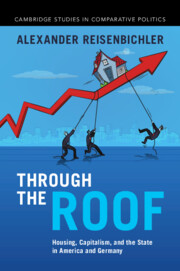Refine search
Actions for selected content:
261 results
General Conclusion and Extrapolations
- from Part III - Labor Empires under Attack
-
- Book:
- Empires of Labor
- Published online:
- 30 November 2025
- Print publication:
- 18 December 2025, pp 271-279
-
- Chapter
- Export citation
11 - Neo-colonialism in the Age of the Welfare State
- from Part III - Labor Empires under Attack
-
- Book:
- Empires of Labor
- Published online:
- 30 November 2025
- Print publication:
- 18 December 2025, pp 246-270
-
- Chapter
- Export citation
Chapter 5 - The Commonwealth versus the Common Good?
- from Part I - Popular Democracy, Representation, and the People
-
-
- Book:
- 'The People' and British Literature
- Published online:
- 11 December 2025
- Print publication:
- 11 December 2025, pp 82-94
-
- Chapter
- Export citation
Caring Like a State: Publicizing Family Caregiving through Medicalization
-
- Journal:
- Law & Social Inquiry , First View
- Published online by Cambridge University Press:
- 05 November 2025, pp. 1-33
-
- Article
-
- You have access
- Open access
- HTML
- Export citation
Disparities in home health-care service utilization and intensity among immigrant older adults
-
- Journal:
- Ageing & Society , First View
- Published online by Cambridge University Press:
- 22 October 2025, pp. 1-20
-
- Article
-
- You have access
- Open access
- HTML
- Export citation
10 - What Governments (Should) Do
-
- Book:
- An Economic History of Europe
- Published online:
- 02 October 2025
- Print publication:
- 02 October 2025, pp 230-253
-
- Chapter
- Export citation
Some Useful Sources
-
- Journal:
- Social Policy and Society / Volume 24 / Issue 4 / October 2025
- Published online by Cambridge University Press:
- 28 November 2025, pp. 718-719
- Print publication:
- October 2025
-
- Article
-
- You have access
- Export citation

Through the Roof
- Housing, Capitalism, and the State in America and Germany
-
- Published online:
- 28 August 2025
- Print publication:
- 11 September 2025
Austerity and Social Spending: Estimating the Long-Run Effects of Fiscal Adjustment
-
- Journal:
- British Journal of Political Science / Volume 55 / 2025
- Published online by Cambridge University Press:
- 18 August 2025, e107
-
- Article
-
- You have access
- Open access
- HTML
- Export citation
Social policy support for families in South Korea during and after the pandemic of COVID-19, from a comparative perspective
-
- Journal:
- Journal of International and Comparative Social Policy / Volume 40 / Issue 3 / November 2024
- Published online by Cambridge University Press:
- 21 July 2025, pp. 237-245
-
- Article
-
- You have access
- Open access
- HTML
- Export citation
Stages, orders & periods of welfare state development: a global sequence analysis of social policy dynamics
-
- Journal:
- Journal of Public Policy / Volume 45 / Issue 4 / December 2025
- Published online by Cambridge University Press:
- 20 July 2025, pp. 549-576
-
- Article
-
- You have access
- Open access
- HTML
- Export citation
3 - Catholicism and the Italian Welfare State in the Nineteenth Century
-
- Book:
- How Economic Ideas Evolve
- Published online:
- 06 June 2025
- Print publication:
- 10 July 2025, pp 66-95
-
- Chapter
- Export citation
4 - Protestantism and Catholicism in German Postwar Reconstruction
-
- Book:
- How Economic Ideas Evolve
- Published online:
- 06 June 2025
- Print publication:
- 10 July 2025, pp 96-128
-
- Chapter
- Export citation
5 - The Influence of Catholicism on Italian Postwar Reconstruction
-
- Book:
- How Economic Ideas Evolve
- Published online:
- 06 June 2025
- Print publication:
- 10 July 2025, pp 129-153
-
- Chapter
- Export citation
1 - Introduction
-
- Book:
- How Economic Ideas Evolve
- Published online:
- 06 June 2025
- Print publication:
- 10 July 2025, pp 1-27
-
- Chapter
- Export citation
2 - Catholicism and the Formation of the German Welfare State
-
- Book:
- How Economic Ideas Evolve
- Published online:
- 06 June 2025
- Print publication:
- 10 July 2025, pp 28-65
-
- Chapter
- Export citation
Political alienation among basic income support recipients in Germany: the role of social exclusion and experiences with welfare state institutions
-
- Journal:
- Journal of Social Policy , First View
- Published online by Cambridge University Press:
- 03 July 2025, pp. 1-20
-
- Article
-
- You have access
- Open access
- HTML
- Export citation
6 - Social Medicine in Social Democracy
-
-
- Book:
- Medicine on a Larger Scale
- Published online:
- 05 May 2025
- Print publication:
- 22 May 2025, pp 122-142
-
- Chapter
-
- You have access
- Open access
- HTML
- Export citation
Do welfare states have lower carbon emissions? The importance of state capacity in lower-income countries
-
- Journal:
- Journal of Public Policy / Volume 45 / Issue 3 / September 2025
- Published online by Cambridge University Press:
- 13 May 2025, pp. 428-448
-
- Article
-
- You have access
- Open access
- HTML
- Export citation
34 - Corporatism
- from Part III. A - The State
-
-
- Book:
- The Cambridge Handbook of Constitutional Theory
- Published online:
- 27 March 2025
- Print publication:
- 24 April 2025, pp 585-602
-
- Chapter
- Export citation
